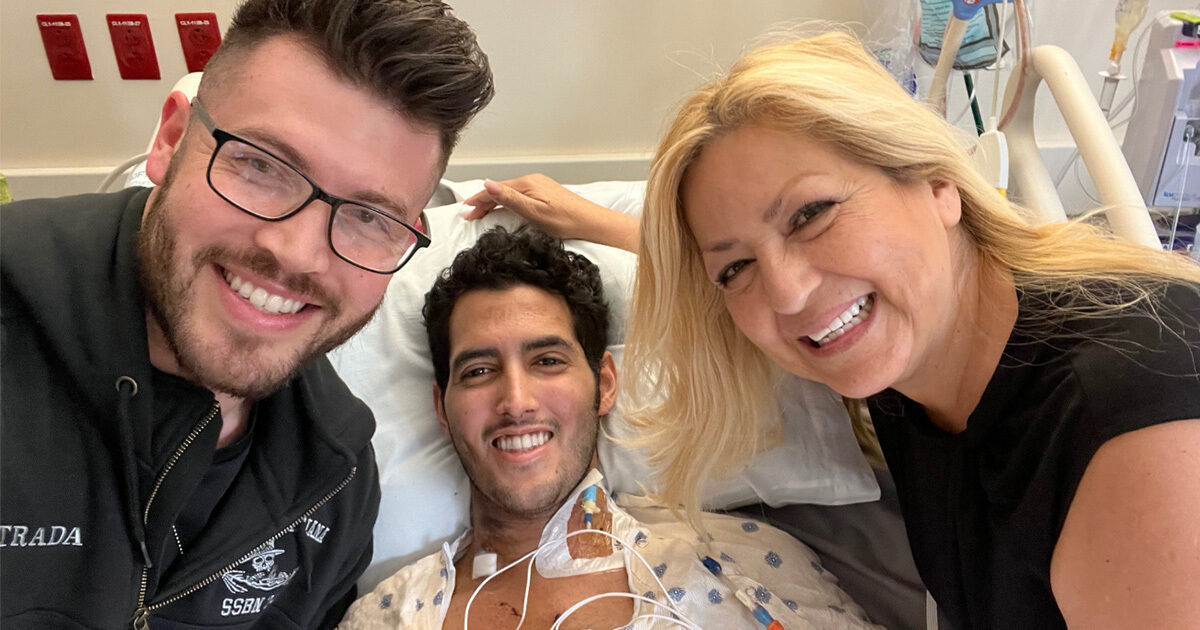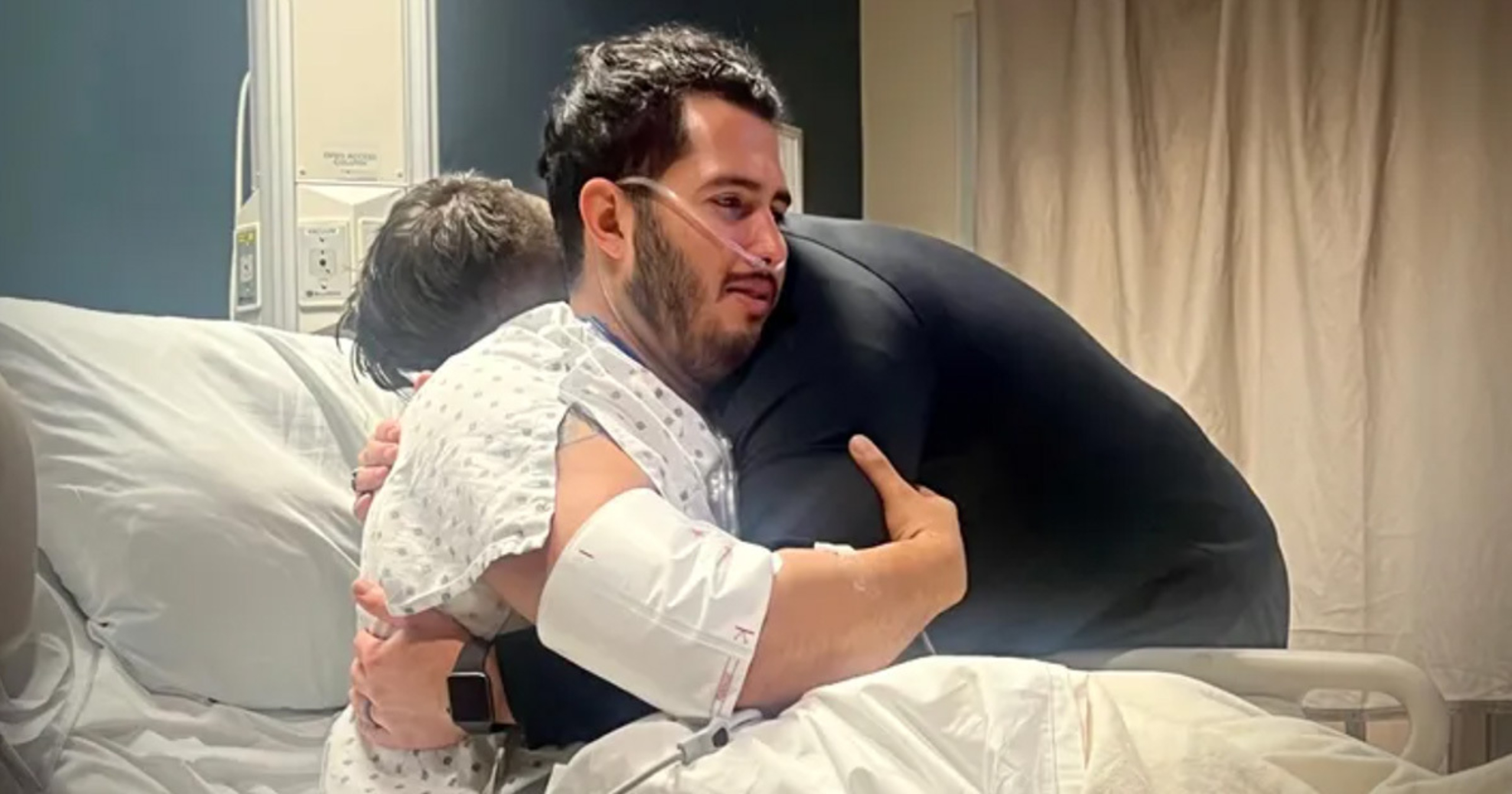Heart and Soul
UT Health Austin cardiovascular surgeons restore the health of an El Paso ICU tech after his unexpected shift from caregiver to patient
Reviewed by: Abraham Estrada, Andes Estrada, Victoria Estrada, William F. Kessler, MD, FACS; and Masahiro Ono, MD, PhD
Written by: Lauren Schneider

On April 8, 2024, as thousands gathered in Austin to witness the alignment of the total solar eclipse, things also started to fall into place for Abraham Estrada, an El Paso resident who had traveled to the city for a very different reason.
That day, Abraham learned that a suitable donor heart had been identified, and he would soon be able to undergo surgery at the Institute for Cardiovascular Health, a clinical partnership between UT Health Austin and Ascension Seton, to correct the congestive heart failure that initially disrupted his life in February of that year.
An Unexpected Challenge
Abraham first noticed chest problems the night of the 2024 Super Bowl. “If I didn’t sit up straight, it felt like my insides were drowning in water,” recalls Abraham. “I couldn’t breathe.”
The next day, Abraham sought medical attention at the clinic where he worked as an intensive care unit (ICU) technician. He was initially diagnosed with pneumonia and prescribed antibiotics but returned to the emergency room days later when he began coughing up blood.
After undergoing CT scans and blood tests, Abraham was referred to the clinic’s cardiology unit, where he was informed that he had congestive heart failure and a thrombus (blood clot) and would need a heart transplant.
Despite Abraham’s dedication to helping others with health issues, he never expected to face such a serious condition himself. “At first, I didn’t know how to react,” says Abraham. “I just started laughing.”
“I have always been healthy and active, so this was surreal,” adds Abraham. “But when I saw the expression on my girlfriend’s face, the seriousness of the situation hit me. I went from laughing to crying.”
Cardiologists in El Paso recommended that Abraham visit a heart failure specialist in Albuquerque, where he was reassured that his condition would remain stable as long as he took his prescribed medications.
However, this sense of security was short-lived. While dining with his family back in El Paso, Abraham began dry heaving and coughing up blood as a fever and chills set in. His family rushed him to a clinic nearby, where his condition appeared more dire than ever.
The Power of Community
Abraham’s sister-in-law, Victoria Estrada, started a crowdfunding page to help with his medical expenses. She was overwhelmed by the support he received when she shared the page on social media.
“El Paso is a loving and compassionate community, so I was not surprised at how they rallied around Abraham, especially given all the connections he had made though his work,” shares Victoria. “What did surprise me was how this online attention resulted in real-world outcomes that changed the course of his treatment.”
Explore ways to support a loved one with a serious illness.
<br>Victoria’s social media posts led to local news coverage and caught the attention of Andrea Lopez, a former El Paso resident and medical salesperson, who shared Abraham’s story with Masahiro Ono, MD, PhD, a UT Health Austin board-certified cardiothoracic surgeon in the Institute for Cardiovascular Health. Dr. Ono also serves as an assistant professor and both the Surgical Director of Heart Transplantation and the Surgical Director of Mechanical Circulatory Support for the Dell Medical School Department of Surgery and Perioperative Care.
“Abraham’s rapid decline over a short period, coupled with his young age, made his case highly unusual and his transfer to the Institute for Cardiovascular Health more urgent,” notes Dr. Ono. “Arrangements were made for Abraham to be flown to Austin to receive care while awaiting a heart transplant.”
Stability and Strength
Upon arriving in Austin, Abraham was placed on a mechanical cardiac support device known as the Impella, which performs the functions of the left side of the heart, to stabilize his condition. As his health continued to decline, he was placed on extracorporeal membrane oxygenation (ECMO), a more intensive form of cardiac support.
“The Institute for Cardiovascular Health is a leading provider of mechanical cardiac support in Central Texas, which allows patients with heart failure to remain stable until their transplant,” explains William F. Kessler, MD, FACS, a UT Health Austin board-certified cardiothoracic surgeon in the Institute for Cardiovascular Health who also serves as an assistant professor in the Dell Medical School Department of Surgery and Perioperative Care. “By transferring to our clinic, Abraham was able to benefit from these cutting-edge technologies.”
Finding a new heart for a six-foot-tall, 29-year-old athletic man with type O-negative blood was no easy task. In the weeks that passed, Abraham was unable to eat or walk freely, his weight dropped, and his muscles atrophied. Despite this uncertainty, Dr. Ono remained a source of calm and stability.
“When I first arrived in Austin, Dr. Ono smiled and told me that I would walk out of there with a new heart,” recalls Abraham. “He was always positive.”
Learn more about UT Health Austin’s commitment to trust.
<br>By the time of his surgery, Abraham’s thrombus had fully dissolved. However, his procedure was not without complications. “A transplant for a patient on ECMO is not an easy surgery to perform or an easy recovery process to manage,” explains Dr. Ono.
Through the combined expertise of the Institute for Cardiovascular Health care team, Abraham awoke with a new heart, surrounded by loved ones.
The First Steps Towards the Future
Days after his surgery, Abraham was visited by his older brother, Andres Estrada. A self-taught musician, Andres performed an impromptu concert for his brother on a piano at the hospital.
Abraham was so moved by this gesture that once he had returned to his room, instead of getting back into his bed, he started walking across the floor to give his brother a hug. “I was so resolved to walk again that I ended up walking past him,” says Abraham. “It felt so liberating to go from being bedridden to walking 150 feet.”
“I did not know what to expect when I came to visit Abraham, and I was amazed by his recovery,” recalls Andres. “I couldn’t imagine what Abraham had gone through, but I knew that if anyone could handle it, he could.”

Over the following days, Abraham worked hard to regain the strength he lost in the weeks leading up to his surgery. He eventually moved from the ICU to the telemetry unit, a specialized area where patients’ vital signs are continuously monitored, another milestone in his recovery.
Abraham was soon discharged from the hospital. To commemorate this achievement, patients at Ascension Seton Medical Center ring a bell as they leave the ICU.
“As I approached the bell, I noticed everyone gathered to cheer me on. Even staff members who were off-duty came in to see me,” notes Abraham. “This staff was so good to my family and me throughout my recovery. The pain in my body seemed to slip away as I was overcome with emotion.”
Learn more about UT Health Austin’s commitment to connection.
<br>Embracing What May Come
Abraham’s journey has profoundly affected his outlook. Thanks to Victoria’s social media posts, he heard from countless El Pasoans he had served in his ICU role.
“Not many people get to see the impact they’ve had on others,” says Abraham. “Hearing from hundreds of people that I touched their lives was powerful.”
This support has strengthened Abraham’s desire to give back to his community through his work. Before returning to his job in El Paso, he plans to stay with family in the Austin area for several months as he continues to recover.
This brief delay in his career has not stopped Abraham from serving others. He is currently providing peer support to another young patient awaiting a heart transplant through the Institute for Cardiovascular Health.
“This experience made me realize how easy it is to take life for granted, and I can’t wait to see where life takes me next once I fully heal and can return home,” shares Abraham, “My heart transplant gave me more time to serve my community. Now, I’m all about embracing gratitude and living each day with grace.”
For more information about the Institute for Cardiovascular Health, call 1-512-324-3028 or visit here.